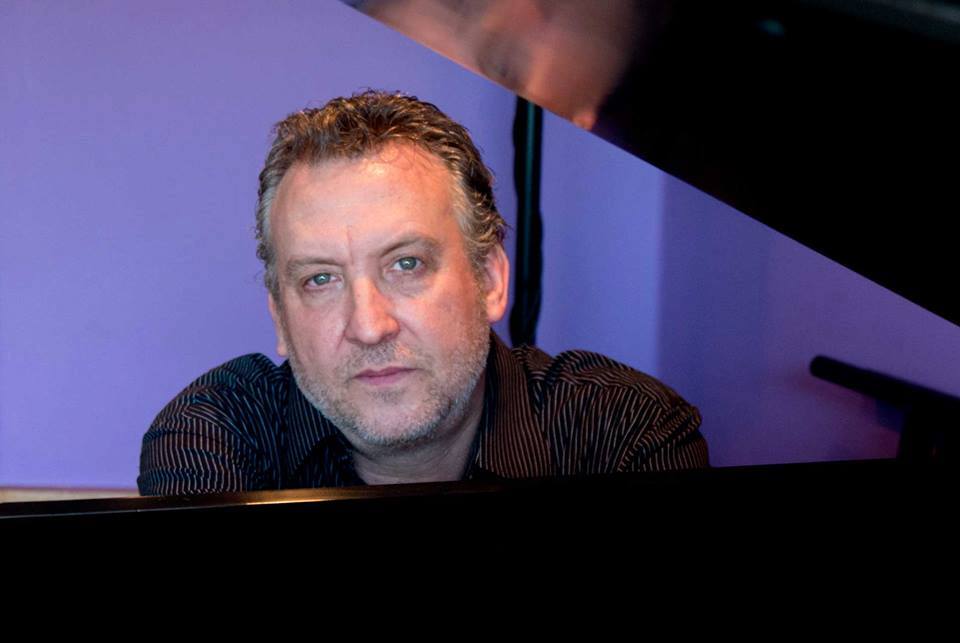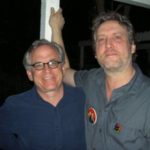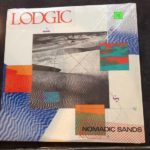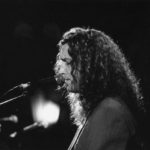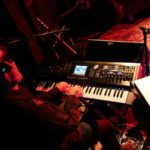For any Toto fan, Michael Sherwood’s name is far from unknown. As a matter of fact, he has been one of Steve Porcaro’s most faithful joint collaborators for the last 30 years. That’s why I wanted to discuss his musical career with him and try to decipher that beautiful complicity. It was the perfect opportunity to evoke the song For All Time that they wrote together for Michael Jackson, but also their common compositions for Toto’s XIV album and of course, Steve Porcaro’s Someday/Somehow debut solo album. Thank you so much, Mr Sherwood, for allowing people to learn more about your career as a keyboardist and a singer, and about your skills as a songwriter and a composer.
First of all, can you tell us how you grew a passion for music and decided to play keyboards as a professional musician?
Well, I was born into a very musical family, all the way back to my great grandparents, then my grandparents and then my parents! (laughs) My dad was a big band leader in the 40s and even before that he was Bing Crosby’s guitar player in the 30s. So he had a whole other life before he met my mother in the 50s. When he settled down with my mom in Las Vegas in 1960 or 61, they started a family there so they could work, and I grew up in Las Vegas in the entertainment scene. My father was working with all the people from the Rat Pack – Sinatra, Judy Garland, Sammy Davis Junior… So I grew up surrounded by the Las Vegas music scene of the 1960s – that was my life as a child, so it was very special and the most special time to be in Las Vegas because it has changed so much since then… So I was born into music and I could play the piano since I could… reach it! Probably around 4 or 5 years old. I was home-schooled by my dad and I always had an interest in the piano. I started out playing by ear and then my father started teaching me the fundamentals. I just always loved the piano and when I became a teenager I played my first Hammond B3 organ and I knew I was in love! (laughs) So I don’t even remember a time when I wasn’t a musician – it’s part of our DNA and that goes for my brother Billy too!
What about Lodgic, your first band? Steve Porcaro and David Paich are credited on your album Nomadic Sands– how did you start working together?
Well, I had several different bands when I was growing up as a young teenager but yes, I did start a band called Lodgic in 1977 with Jimmy Haun who has been my best friend since 3rd Grade – and he is still my best friend. He played all the guitars on Steve Porcaro’s solo album. We’ve always worked together throughout all the years. So Lodgic was Jimmy and I, Gary Starnes on drums and Mark Fletcher on bass. First, we started out just playing music that we loved but it was very challenging music – we were playing a lot of Return To Forever, Frank Zappa and Jeff Beck, things that were just fun to play and challenging. We were teenagers and we just wanted to play the hard stuff, you know! Eventually we were discovered by someone in Los Angeles who brought us out here and put us into a place to rehearse and start developing and writing our own music. Billy ended up joining the band quite young when we switched bass players – he was 16 since he is 6 years younger than me. One of the big jokes was we used to play Yes songs all the time when he was 12 years old and he would beg : « Can I play drums on the Yes songs? » And we would all laugh and say « No » but I guess he got the last laugh on that one! (laughs)
When we came out to LA we were struggling for a while – we all had day jobs and we were playing showcases and trying to get signed. Our manager was smart enough to put us in a place called Leeds Rehearsals owned by Andy Leeds. He knew that it was where Toto rehearsed and he said : « It’s a good place for you to be. If you want to play with the big boys, you should rehearse where the big boys rehearse! » That was a very smart move because when we were rehearsing one day in 1983, Toto had just swiped the Grammys with Toto IV and they were doing very well in very good spirits, and they were rehearsing in the big room while we were rehearsing down the hall. One of our technicians came in and said : « Hey! There’s a guy outside the door with glasses that thinks you’re really good! He wants to know if he can come in. » I thought : « Well, that’s Jeff Porcaro! Of course, he can come! » So Jeffrey came in and he listened for a while. Then he went : « Do you mind if I go and get the guys? » I said : « Ooooookay!!! » (laughs) He went and got Steve and Mike Porcaro, Steve Lukather, David Paich, of course. They all came in and listened to us play a few songs, and that was very scary but fun! Then they left. Later, David Paich approached us about possibly producing and acting for us to try and find us a record deal. That’s how it started – because Jeff liked what he heard through the walls ! They eventually got us a deal with A&M Records and Steve Porcaro and David Paich produced our record Nomadic Sands but they didn’t play on it. So basically, they gave us a career and put us on the map! That was very very fortunate and I’ve always felt a great debt to them.
At the time, could you feel it would be a long-lasting collaboration?
We all had our different interests and my songwriting interest was a little bit going in a different direction than Lodgic was. I was writing some different songs with another gentleman and Lodgic became more of Billy and Guy Allison’s sort of vision. I was going my own way and I started going down to where the Toto rehearsed, right where David Paich lived. I would go there and hang out with those guys and I became very friendly with Steve Porcaro. He liked my voice and how it sounded on his music, and he used to have me come down there and sing some demos of his songs. He was also going in different directions from his band. He had written Human Nature for Michael Jackson and he felt a little bit like he was falling away from Toto. So when they were doing the Fahrenheit album, I was hanging around and doing a lot of work with Steve. We began writing together and that’s when I began singing demos of all of his songs. He asked me if I would sing background vocals on this song of his, Lea, that was going to be on the album. So I went in there and sang all the out chorus back and forth « Lea, do you still want me… » and it came out really nice. David liked it and he called me and asked me if I would stack up some vocals for Till The End. So I did all the vocals back there and all the choruses.
But shortly after Fahrenheit came out, Steve decided to leave Toto. Right around that same time Lodgic had disbanded and Billy and Guy continued on with a band called World Trade, and Steve and I continued a long long writing recording relationship that has lasted for 30 years until we finally ended up with his record! (laughs) A lot of the songs we wrote together we were writing for other people – we wrote a lot for Michael Jackson but also all kinds of different people. So we ended up with so much material that a few years ago we looked at each other and said : « You know what, let’s just make this solo album! » Steve is probably one of the closest friends I have in the world. David and I are very close too – we have written a lot of songs together and he heard some of the stuff I was doing with Steve for the solo album and asked me if I would come and participate and do some lyrics for Toto XIV – he wanted me to do Chinatown.
But the track Chinatown was initially a 1977 demo, wasn’t it?
Yes, it was an old old track they gave me and it was very unusual to listen to Jeff and David Hungate, all the original guys. I wrote a song to the original track so you know, I would get chills because it sounded like the Boz Scaggs album. My job was to bring the lyrics up and since it was singing about a particular place, I just wanted to make sure that everything was true and that all the locations we were talking about were correct. He would say something about Grand Street and I would say : « No, no, no, Grand Street doesn’t go to the cable cars – it’s Grand Avenue! » Things like that, you see, so I kept him honest! But that went very well.
Regarding the tracks All The Tears That Shine with David Paich again, and Bend with Steve Porcaro, what was the creative process of these songs?
Well, we had already written All The Tears That Shine together a couple of years before, actually trying to pitch that song to some other artist so it was not written as a Toto song. David called me and said that Toto was interested in the song and that he was going to sing it. So we finished up the verses and that went very well too. Dave and I have a very fun and warm relationship – we laugh a lot! But we can get very serious when it’s time to get to work.
On Steve’s solo album, there was the song Bend but also another one called The Little Things and Toto decided they wanted to put it on their record. I didn’t write The Little Things but I did participate and help in organize some of the lyrics, not enough that I thought I would consider myself a songwriter but I did work really hard on that song. On Bend, I was originally the singer and most of these are my lyrics. That song was never intended to be on a Toto album until they needed an extra song for the Japanese release. I wish it would have been on all of the records but unfortunately it’s only on the Japanese version and that saddens me a little bit.
Anyway, that’s how that came to be and I’ve had this long working relationship with these Toto guys for a long long time…
Can you tell us more about the creation of the track For All Time that was supposed to feature on the Dangerous album?
Michael had called and he wanted a follow-up, something that was in the vibe of Human Nature and obviously something from Steve. We wrote several songs and one of them was For All Time. He was going to put it on the Dangerous album indeed and it was supposed to be the ballad. Michael recorded it and it was coming out really well so we were really excited. But then there was this kid, Ryan White, who died of a blood transfusion contracting AIDS, and it was very sad. Michael had this beautiful song called Gone Too Soon and it had to go on the record. So it kind of knocked our song off the Dangerous record. We were hoping that maybe it would be on the next record, then we hoped it would be on the next record and then we finally just gave up on it and continued writing. At some point Lionel Richie was approached and he was interested to perform it. Steve told me that they did a track for him with Nathan East and some other people but I never heard it and it never surfaced.
It was eventually released in 2008 on the Thriller 25 record. Do you know why it was actually chosen for that project? How did it feel when you heard the news?
Well, in 2005, maybe early 2006, we got a call from Michael saying that he was releasing the Thriller 25th anniversary record and that he would like to put For All Time on it. We were very surprised but we dusted it off and finished it up. It was 20 years later but you must never give up because you never know! It was a very pleasant surprise when Steve called me and said : « Are you sitting down? » I said : « No. » He said : « Sit down! » (laughs) Then I talked to Michael because I wanted to rewrite the verses. You know, 20 years later, I was a better writer so I said : « Can I please rewrite the verses? I love the chorus and the bridge, but I think the verses need a little more work. » But Michael said : « Oh, no, I want to keep it just like it is! » I said : « All right. » thinking to myself « You’re the King of Pop!… » (laughs)
Any anecdotes or memories of these studio sessions with Steve Porcaro and Michael Jackson?
I remember the sessions at Record One and Michael coming in and just being really professional and helpful and friendly but quiet. The thing is we had done most of the work 20 years before and all we did was brush it off and update some of it. Then Michael sang some of his things and finally sang the bridge which he hadn’t done before. So I didn’t really get close to him beside maybe a day of working with him. Otherwise it was Steve and I doing our things.
Later on, you got involved in the XIV album by Toto. Nearly 30 years after Fahrenheit, how had the creative process of the band evolve in the studio?
The technology has changed so much, you know, and I would not know a lot about their process back in the days because I would come in and do background vocals. I wasn’t really at a lot of Toto sessions because I would go down to David’s studio at his house and also to Jeffrey’s studio. For XIV it was really just a question of pushing up the lyrics by working on the words and making sure that the lyrics and the melodies were all in place. Like I said the stuff that I wrote with Steve for XIV was actually taken from other groups of songs for his solo album. Those were songs for Someday/Somehow that Toto took.
Regarding Someday/Somehow, would you say this is your most important joint collaboration with Steve Porcaro?
Absolutely! By far. Steve and I have been working together for so long and we have the same harmonic vocabulary and the same sensibilities. Whatever Steve was going through personally we would have conversations about and we would find the title. Then I would just go off and work up the lyrics. We would sit in a room together and bang off the lyrics until we both loved them. My job mostly came from conversations and titles, and then we would talk. It’s just a process that has been ongoing for such a long time. A song like Swing Street that Michael McDonald is singing was probably written in 1990 or 1991. Jimmy Haun played the original guitar way back then and when Steve Lukather came in he liked Jimmy’s parts so he just added some things.
This record is a labor of love and probably my proudest achievement as a songwriter and a co-producer. Steve and I really brought it home. All he needed was a deadline because he was working so hard on this Justified TV show. I said : « Steve, let’s pretend this album has to be on TV in December. What are we going to do? » So we gave ourselves a deadline and that’s when the record really started to come together. We didn’t make the deadline but at least we had one! (laughs) It wasn’t out till June and our deadline was January but we started finishing touches on everything and brought in the real string sections and the real horn sections. All the beautiful drummers including Lenny Castro, of course, and Lukather came in and did help. Jimmy Haun did most of the guitars as always since he’s my number one guy. So well, we finished it up, finally, after 30 years!
Steve Porcaro performed 7 out of the 13 tracks on the album, while you sang Make Up and Michael McDonald and Mabvuto Carpenter also delivered performances on other tracks. How were those choices made?
At first, I was singing most of the demos but once we decided to make a Steve Porcaro record, I was sort of insisting that anything Steve felt comfortable singing he should sing. So he replaced a lot of my vocals and I was very happy about it because he did a great job on the vocals. The only thing I held on to was the song Make Up – it was the only one I wanted to keep my voice on because I just thought my voice was more suited to that song.
Also, I had always wanted Michael McDonald to sing the song Swing Street. When I sang the original demo, I would sometimes do a bad imitation of Michael McDonald and make Steve laugh. But all through the years I said : « Michael McDonald should sing this song! » and Steve would go : « Ok, all right… » He got tired of hearing me say that. Then he called me in 2016 and said : « You’ve got to come over and help me cut some vocalist on the record. » I said : « Who is it? What song? » He just went : « Come over. » (laughs) So I went over there and I walked in and there was Michael about to sing Swing Street! I had to produce the session and Steve just sat there smiling because he knew I had been saying it for 15 years and he finally got to see the look on my face! We were very pleased about that.
Like I said, I thought Steve had to sing most of the record songs, like 6 or 7 songs, but if we were to bring any other singer, they had to be relevant to the Porcaro / Toto world. I mean, these are all my thoughts – well, Steve and I together coming up with these concepts. So we thought Michael McDonald would be a good choice because he’s on a lot of the Toto albums and he’s part of that whole family, and maybe Mabvuto (Carpenter) would be good too.
Jamie Kimmet’s voice sounds a lot like Michael Jackson’s to my ears. Was it your initial intention to find this kind of singer to perform tracks that were supposed to be sung by the King of Pop ? How did you discover him actually?
Well, we wanted this to be a Steve Porcaro album and I had been working with a gentleman named Jamie Kimmet from Scotland a few years back. Jamie has this beautiful high voice that you might hear a little bit like Michael. I said : « Steve, do you have any song that has a high range? I think we should try this kid Jamie. » So I brought him over here and Steve just fell in love with his voice. We certainly weren’t trying to make him be Michael Jackson – he just has that natural sound in the same kind of vibe. So for anything up in the high-range, we thought we should use Jamie Kimmet because he’s got the perfect voice. Even when it’s not Steve singing the lead, I want the listeners to get that experience that they know they’re listening to a Steve Porcaro song. I think that with our choices of singers we were able to achieve that.
On the song Back To You, we can hear some takes that were done during the Isolation album sessions, with Jeff and Mike Porcaro. Was it a complex thing to do, technically speaking?
Actually, because of the arch of time of the record, Mike Porcaro was the bass player on everything except the title track Someday/Somehow (which is my favorite song on the album, by the way). Before he fell ill Mike would come in and drop on bass lines for us all the time. So he ended up being the bass player on the whole record which was wonderful! Then I suggested that we look for an 8-bar or 16-bar loop of Jeffrey because I thought : « Since Mike’s on the record, then we can have the three brothers on it! » At first, Steve said : « Hum… That sounds a little bit forced. » And he was right. But then one day we saw this 24-track tape in a corner and I said : « Wait a minute. That’s the 3 of you! » Steve said : « Yeah, it’s a Toto song. » So we transferred it over and listened to it, and we could tell that everybody else, Lukather and all of them, were just trying to get a good rhythm track – it was all about giving a good drum track and a good bass track. Nobody had finished their part except Mike and Jeff. Greg Ladanyi had recorded it so well that we were able to use it. It was just a matter of transferring it to the computer and building up around what was already there. The synthesizer was already there too – Jeff and Mike had played to Steve’s synthesizer sequence, to the click. On that song, I just helped Steve arrange the lyrics, move some of the words around and make some choices but pretty much not enough to where I would consider myself a songwriter but I helped him finish it. Then we had it! We just had the three brothers reunited in real time as it happened in the studio in 1983. It was a beautiful thing! I added some background vocals on it because who wouldn’t want to be on that recording! (laughs) We also added a little bit of penny whistle from my friend Don Markese and we were able to reunite the brothers in a very honest way.
Do you think it could give some ideas to the Toto guys for their coming album celebrating the band’s 40th anniversary?
Yes, I’m sure that the Toto guys are looking for some old tracks with the brothers for their record coming up and they’re going to find some stuff. I’m positive they’re going to bring Jeff and Mike back again. But we did it first! (laughs)
Will you be involved in that new project and how do you feel about it ?
I do not know. Usually I just get a call. They know I’m available and if they need me they got me! I don’t know which songs Steve is going to choose for the record. I know that a lot of his catalogue I’m already involved in so I just wait to see. I hope so ! Any way I can help, I’m always there!
What makes Steve Porcaro and yourself such complementary people, both on the human and professional levels?
Well, we’re very like-minded individuals. We laugh a lot and we have very serious conversations about very important things. We’ve helped each other through some hard times and we have a very very strong connection like brothers. But we keep it light – we do like to laugh and we share the same sense of humor. We have the same harmonic vocabulary, we think the same way, we like the same kind of things, we enjoy the same kind of music… We’re just a good team and we have been for a long time. I was very pleasantly surprised that I got the co-producer title because I wasn’t asked for it and I didn’t ask for it. I didn’t know until we were finished that he was going to tell me that I was the co-producer. Although that I do agree that I did co-produce it but I wasn’t expecting that. That wasn’t my motivation but I was very happy to find out that he had given me that title and I’m very proud of it.
As a conclusion, what other tracks would you recommend people should listen to in order to discover your discography?
I have two albums on Bandcamp right now. One is called Groovy Lemon Pie – I did it with another partner of mine named Christian Nesmith (his dad is Mike Nesmith from The Monkees). It’s kind of more poppier but it’s something I’m very proud of. The other one is a record I did in 1997 called Tangletown. That’s more deep and it highlights a lot of my writing and my lyrics and my voice – that was my group from the early 90s. Then I have a new record that I’m working on right now which you’ll know more about later. There’s also another record called Swifty’s Bazaar that I did over a four-year period. That is a combination of everything I’ve ever loved from Return To Forever to Frank Zappa and it’s all designed to be listened to as one piece of music. It’s a real fun sonic journey of all different kinds of genres with some pretty things, a lot of very challenging instrumental things and funny little in-between like talking and phone calls from record company pricks… It’s a really fun record and I’m very proud of that one too. I did it with a guy whose name is Andrew T. Rosenthal and you can find it on itunes but you have to pay attention that there is no gap between the songs because you have to listen to it as a sonic journey.
